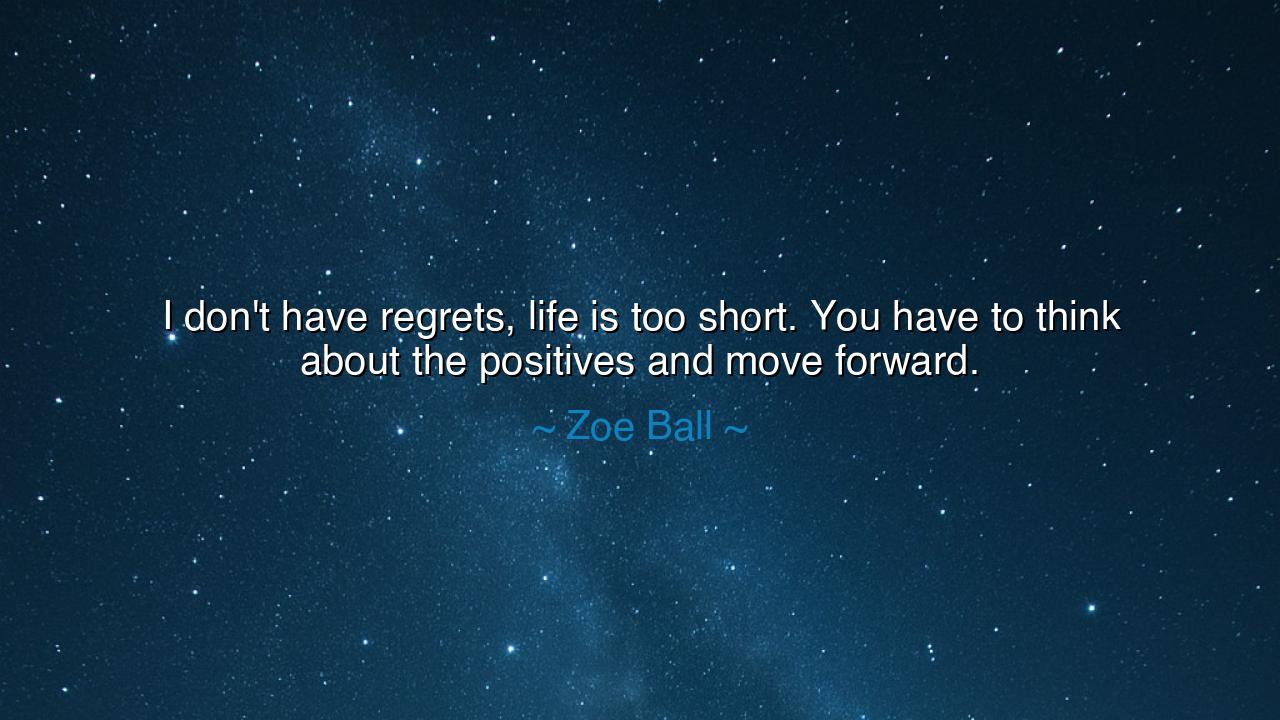
I don't have regrets, life is too short. You have to think about
I don't have regrets, life is too short. You have to think about the positives and move forward.






The words of Zoe Ball—“I don't have regrets, life is too short. You have to think about the positives and move forward.”—resound with the clarity of one who has walked through life’s storms and chosen hope over despair. In them we hear the wisdom of impermanence, the knowledge that time is fleeting, and that to cling to regrets is to waste the precious gift of days. She speaks not as one untouched by sorrow, but as one who has decided that sorrow shall not have the final word.
The ancients knew this truth well. The Stoics taught that regret is the child of wasted thought, for what is past cannot be altered. Seneca reminded his pupils that life is short and uncertain, and that we must therefore seize each day as though it were a gift from the gods. Zoe Ball’s words echo this wisdom: life is too short to be shackled by mistakes or haunted by “what ifs.” The only path of freedom is to gather what good can be found, to learn, and then to press onward.
History gives us many who lived by this principle. Consider Thomas Edison, who failed countless times in his pursuit of the electric light. When asked about his failures, he replied that he had not failed, but discovered thousands of ways that did not work. He bore no regret for the trials, for each step carried him closer to triumph. His focus on the positives, rather than on the bitterness of failure, allowed him to gift the world with a light that dispelled the darkness of night.
Zoe Ball’s wisdom also speaks to the heart of human resilience. To dwell upon regrets is to chain oneself to the past, but to move forward is to honor life itself. For life, like a river, flows ever onward; it does not turn back to its source. Those who cling to yesterday are swept away in sorrow, but those who look ahead ride the current with courage, discovering new horizons. Thus, her words are both gentle and heroic: a reminder that the only true direction is forward.
Yet her focus on positives is not mere cheerfulness, but a discipline of the soul. To see light in the midst of shadows requires strength. To search for blessings even in loss requires vision. The wise know that life is never without pain, but they also know that pain can reveal hidden treasures—wisdom, compassion, resilience—that can only be found when we choose to look. In this way, positivity becomes not denial of suffering, but the transformation of it.
The lesson for us is profound: let go of the regrets that weigh you down. They cannot change the past, but they can poison the future. Instead, choose to seek the positives—the lessons, the small victories, the moments of joy—and let them be your compass. Move forward not in bitterness, but in gratitude, for every step carries you closer to what is yet to come.
So, dear listener, carry Zoe Ball’s words with you. Remember always that life is too short for chains of regret. Live not in the shadow of what might have been, but in the light of what can still be. Think of the positives, take them into your heart, and step boldly forward. For the past is gone, but the future waits—alive, radiant, and ready for those who dare to embrace it without fear.






Ttrung
This statement emphasizes positivity and moving forward, yet I question how it applies in complex situations where decisions have long-term consequences. Can focusing on positives coexist with accountability and learning from mistakes? I also think about the emotional impact—does this philosophy reduce anxiety and rumination, or could it create pressure to always appear optimistic? Exploring the balance between acceptance, positivity, and personal responsibility seems key to understanding this mindset.
HNHuong Nguyen
I’m intrigued by the notion of living without regrets, but it raises questions about practical application. How does one maintain this approach when faced with significant personal or professional failures? Could it encourage forgiveness, both of oneself and others, and reduce unnecessary stress? I also wonder whether this mindset can be taught or developed through habit, therapy, or reflection, and if it varies across cultures or individual life experiences.
TATruc Au
This quote prompts reflection on the concept of life philosophy and attitude. How do we cultivate a mindset that emphasizes positives without becoming naïve or dismissive of challenges? I also wonder about the role of gratitude and mindfulness in sustaining such an outlook. Can consistently focusing on the positives improve mental health and relationships, and how do people reconcile this with inevitable setbacks or moments of disappointment?
DMPham Thi Diem My
Reading this makes me think about the balance between positivity and realism. Is focusing on positives always beneficial, or might it sometimes lead to overlooking potential pitfalls? I also question whether avoiding regret entirely is psychologically sustainable—does it risk creating a superficial sense of contentment, or is it genuinely empowering? This approach seems to encourage resilience, but I’m curious how it interacts with personal growth and accountability.
NNganhappiiii
I find this statement inspiring because it emphasizes forward momentum, but it raises questions about emotional processing. Can someone truly move forward without confronting past disappointments or failures? I also wonder whether this philosophy is easier for some personalities than others, and how life circumstances might affect the ability to focus on positives. How can we cultivate this mindset without suppressing necessary reflection or introspection?